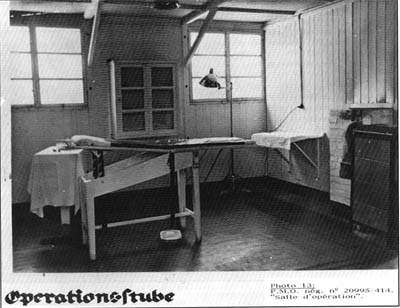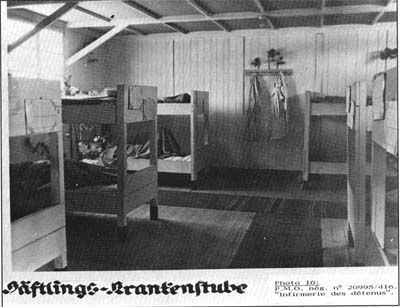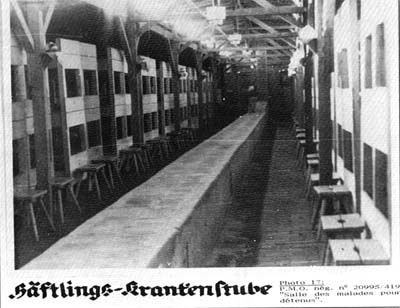|
|
 |
 |
AUSCHWITZ:
Technique
and Operation
of
the Gas Chambers © | |
|
| |
 |
Back |
 |
Contents |
Page 510 |
 |
Home
Page |
Forward |
 |
| |
KL AUSCHWITZ-BIRKENAU
AS PRESENTED BY THE
BAULEITUNG |
| |
The three photographs al the top of page 8 of the Bauleitung
Album [Photo 7] show authentic and real installations at the central
camp, and they must have functioned according to the human and
material possibilities. The validity of these photographs must be
admitted and they cannot be dismissed as pure propaganda. Their
purpose was not to mislead humanitarian organizations like the Red
Cross, but simply to give a favorable image of the activity of the
Auschwitz Bauleitung to ranking SS who visited the camp, to whom
such albums of photographs were frequently presented.
Photos 13, 14, 15, 16, 17, 18 and 19 concern the
second stage of construction of Birkenau [KGL Bauabschnitt II]. They
are presented on page 73 of the Bauleitung Album and concern in
particular the organization of the health and sanitation service
[PMO neg. no. 20995/420 of the disinfestation installation in the
Gypsy camp, which appears on this page is reproduced in Part I.
Chapter 6, “The disinfestation installation in the Gypsy camp”].
Apart from the pine branches, mats and cloths introduced to “pretty
up” the scene, this was in fact the living environment, somewhat
stark of SOME of the prisoners in BA.II. The floors shown are
concrete, parquet or brick. In other barracks they were of bare
earth. The WC bowls [Photo 19] were a rarity, unlike the wash
troughs [Photo 18] that were a standard model installed all
over the camp. Photos 17, 18 and 19 reflect a reality from
which the great majority of prisoners were excluded.
The
question of the NUMBER of prisoners with respect to the health
installations of Photos 13,14, 15 and 16 arises, and reveals
the pitiful inadequacy of the facilities. How many patients could he
treated with the products contained in the pharmacy cupboards?
Certainly the few people shown in the half-empty sick room [Photo
16]. The two pictures are in harmony. But on Photo 17 of
the large ward, one may well ask where the temperature charts are
that are so well in evidence in Photo 16, and whether the
small pharmacy Photo 14 was adequate for such a large number
of people. The sordid reality of a prisoner with diarrhoea lying on
the upper bunk, unable to move and soiled by his own excrement,
suffering from fever and whose treatment consisted of one suck, not
two, at an aspirin attached by a string, whose drinking water was
barely filtered and worsened his condition, proves that at Birkenau,
these photographs with their functional titles are tragically
cynical in their insignificance. |
|
 |
Photo13:
[PMO neg. no. 20995/414]
“Operating
theater” |
|
Photo 16:
[PMO
neg. No. 20995/416]
“Prisoners’ sick room”
|
 |
|
 |
Photo 17:
[PMO
neg. No. 20995/419]
“Prisoners’ sick
room” | |
|
| |
AUSCHWITZ:
Technique
and operation
of the gas chambers
Jean-Claude Pressac
© 1989, The
Beate Klarsfeld Foundation |
 |
Back |
Page 510 |
Forward |
 |
|

